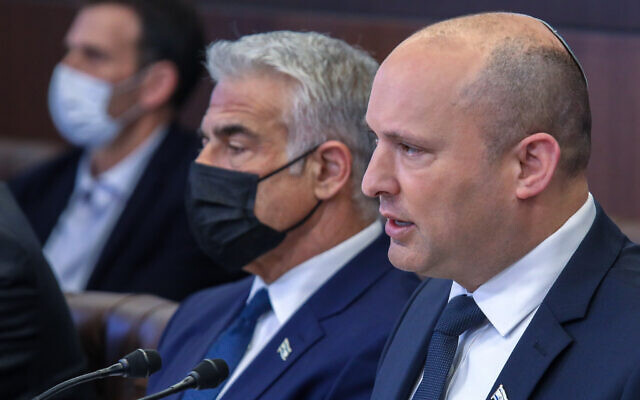PM advises work from home, pleads with public to vaccinate their children before strain becomes widespread, which he predicts will happen in several weeks

Prime Minister Naftali Bennett said Sunday that the highly infectious Omicron variant is driving Israel’s fifth wave of coronavirus infections, and urged the public to preempt an expected surge in morbidity by vaccinating children and curbing gatherings, including working from home if possible.
At a live press briefing from his office in Jerusalem timed for the start of Israel’s prime-time television news broadcasts, Bennett said the government is doing everything to buy the country time before the Omicron variant becomes widespread.
So far, at least 175 Omicron cases have been confirmed in Israel, including 40 on Sunday alone.
“I believe within three to four weeks, perhaps sooner, we will see a jump in morbidity that will leave no room for doubt” over the severity of the outbreak, he said.
During this time, it is crucial to vaccinate as many people as possible, particularly children, Bennett argued.
“Vaccines for children are safe, and they are the responsibility of parents,” he said. “Don’t leave your children vulnerable to Omicron.”
“The goal is to get through the wave while keeping the economy and education working — and the goal is to vaccinate the children of Israel,” Bennett said.
“Every hour you wait is a wasted hour. After the first shot, it will take children four to five weeks to be protected. If you wait for the wave to hit, it will be too late,” he warned.
Bennett stressed the dangers of prolonged damage that can be caused by the coronavirus — so-called long COVID — and said that earlier in the day, a teenage girl who had become ill and then recovered from COVID had joined ministers at their weekly cabinet meeting to speak about her experience.
Michal Zehut had gone from being an active, successful student to one who is exhausted at even the smallest physical effort and struggles with memory issues hampering her studies, Bennett said.

The prime minister also urged business owners who can have employees work from home do so, in order to reduce public interactions, saying that the same measure would be taken in the public sector. He called for diligence in wearing face masks and avoiding public gatherings.
Bennett said the government would introduce additional restrictions due to lingering uncertainty on how effective vaccines are against Omicron, though he did not specify what he has planned.
But the Kan public broadcaster reported that the premier has already asked for regulations to be drawn up that will see 50 percent of those employed in the public sector work from home.
In addition, Bennett wants to expand the so-called Green Pass system — which limits entry to various public places to only those who were vaccinated or recovered from COVID-19 in the previous six months, or have taken a recent negative test — to include malls and larger street stores, the report said.
At the briefing, Bennett took questions from reporters and was challenged over apparent inconsistencies in government policy that undermine public faith in the leadership, such as the premier backtracking on an earlier plan to restrict access to malls, as well as his wife taking a holiday in the Maldives, even as Bennett himself was urging the public against international travel.
“There are different opinions, we are a diverse government,” Bennett replied. “We eventually converge on decisions and move on. Epidemic management is a complex thing and Omicron is different” from previous mutations.
An attempt by Bennett last week to introduce the Green Pass in malls had been planned to go into effect Friday, but was postponed after ministers failed to reach an agreement on the regulations.
Kan reported Sunday that it was Foreign Minister Yair Lapid who was most stubbornly against the plan, eventually leading to it being dropped.
But a government source told Kan that ministers who objected in the past are more likely to agree now, in light of infection rates and predictions presented at Sunday’s weekly cabinet meeting.

Ministers reportedly reviewed data showing the likelihood of a significant outbreak of COVID-19 within three weeks, with the peak surpassing that of the Delta wave, which started in June.
At the meeting, Bennett criticized ministers for not approving the Green Pass for malls the week before, telling them they had “fled” from applying it, Kan reported.
The Health Ministry said Sunday that 390 new COVID-19 infections were diagnosed the day before, the low number reflecting reduced testing over the weekend.
As reported by The Times of Israel
